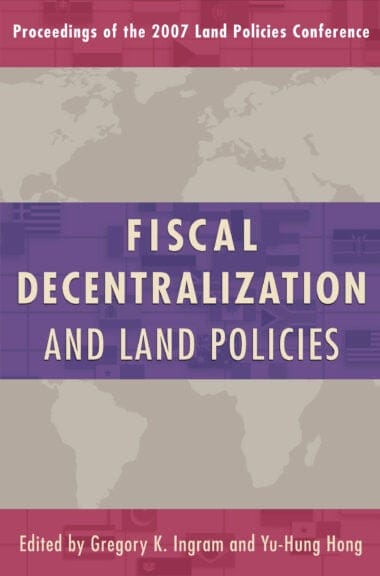Libros

Fiscal Decentralization and Land Policies
Edited by Gregory K. Ingram and Yu-Hung Hong
Mayo 2008, inglés
Lincoln Institute of Land Policy
The study of fiscal decentralization has important policy implications for urban growth management, environmental conservation, and property taxation. First, fiscal decentralization gives local governments powers to set local taxes and make local expenditures. Second, in many countries local governments also have powers to regulate land uses within the general guidelines set by higher authorities. These two powers interact so that municipalities often make land use decisions while considering their fiscal effects. Hence, an understanding of the degree to which local and provincial governments can exercise power, make decisions about their revenues and expenditures, and are held accountable for outcomes is crucial for land policy research and education.
In June 2007 the Lincoln Institute hosted the second in its series of land policy conferences to address international trends and emerging issues. The goals were to review decentralization experiences in Organization for Economic Co-operation and Development (OECD) countries and developing nations and to explore areas of consensus and disagreement among scholars and analysts on the opportunities and risks of decentralization.
Three key themes emerged from the conference.
- the extent and effectiveness of local service provision under decentralization;
- the connections between decentralization and local policies; and
- the effects of intergovernmental transfers on issues such as local fiscal prudence, the association between decentralization and income distribution, and new institutional arrangements for decentralization.
About the Editors
Gregory K. Ingram was the president and CEO of the Lincoln Institute of Land Policy from 2005 to 2014.
Yu-Hung Hong was a visiting fellow at the Lincoln Institute of Land Policy.
Table of Contents
Introduction
1. The Nexus of Fiscal Decentralization and Land Policy, Gregory K. Ingram and Yu-Hung Hong
Achieving Decentralization Objectives
2. Opportunities and Risks of Fiscal Decentralization: A Developing Country Perspective, Roy Bahl
3. Local Revenues Under Fiscal Decentralization in Developing Countries: Linking Policy Reform, Governance, and Capacity, Paul Smoke
Commentary: Robert D. Ebel
4. Local Service Provision in Selected OECD Countries: Do Decentralized Operations Work Better?, Ehtisham Ahmad, Giorgio Brosio, and Vito Tanzi
Commentary: Paul Bernd Spahn
Decentralization, Local Governance, and Land Policy
5. Political Structure and Exclusionary Zoning: Are Small Suburbs the Big Problem?, William A. Fischel
Commentary: Lee Anne Fennell
6. School Finance Reforms, Property Tax Limitation Measures, and the Distributions of Expenditures and Class Sizes, Daniel P. McMillen and Larry D. Singell Jr.
Commentary: Dennis N. Epple
7. Decentralization and Environmental Decision Making, Shelby Gerking
Commentary: Lawrence Susskind
8. A Cross-Country Comparison of Decentralization and Environmental Protection, Hilary Sigman
Commentary: Maureen L. Cropper
9. Interjurisdictional Competition Under U.S. Fiscal Federalism, Sally Wallace
Commentary: Jeffrey S. Zax
Emerging Challenges and Opportunities
10. Local Government Finances: The Link Between Intergovernmental Transfers and Net Worth, Luiz R. De Mello
Commentary: Ronald C. Fisher
11. Fiscal Decentralization and Income Distribution, Jorge Martinez-Vazquez and Cristian Sepulveda
Commentary: Christine P. W. Wong
12. Public and Private School Competition and U.S. Fiscal Federalism, Thomas J. Nechyba
Commentary: Helen F. Ladd
13. Community Associations: Decentralizing Local Government Privately, Robert H. Nelson
Commentary: Robert W. Helsley
14. Increasing the Effectiveness of Public Service Delivery: A Tournament Approach, Clifford F. Zinnes
Commentary: José Roberto R. Afonso and Sérgio Guimarães
Palabras clave
avalúo, conservación, desarrollo económico, economía, medio ambiente, planificación ambiental, temas legales, gobierno local, salud fiscal municipal, planificación, políticas públicas
